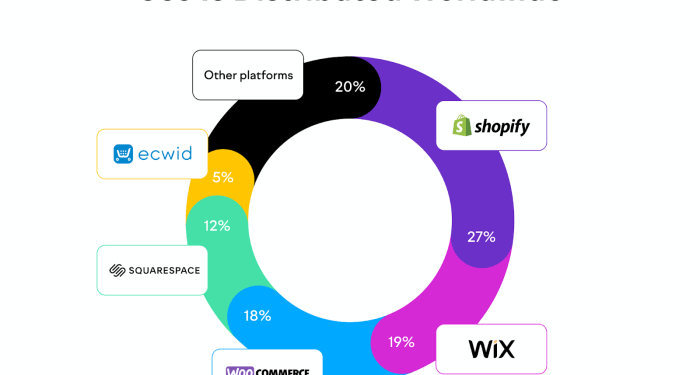In today's digital age, the role of ecommerce platforms in fueling the growth of small and medium businesses cannot be overstated. These platforms have completely transformed the way SMBs operate, offering a myriad of benefits that propel them towards success.
From enhancing scalability to reaching a broader customer base, the impact of ecommerce platforms on SMB growth is profound and far-reaching.
As we delve deeper into the realm of ecommerce platforms and their significance for SMBs, a fascinating journey unfolds, showcasing the power of technology to drive business growth in unprecedented ways.
Importance of Ecommerce for SMB Growth
Ecommerce platforms have become a game-changer for small and medium businesses, revolutionizing the way they operate in today's digital world. These platforms offer a wide range of benefits that enable SMBs to reach a broader audience, increase sales, and scale their businesses like never before.
Increased Reach and Visibility
- Ecommerce platforms allow SMBs to establish an online presence, reaching customers beyond their physical location.
- By leveraging digital marketing strategies, such as and social media advertising, SMBs can enhance their visibility and attract a global customer base.
- Online marketplaces and platforms enable SMBs to showcase their products to a larger audience, leading to increased brand awareness.
Enhanced Customer Experience
- Ecommerce platforms offer a seamless shopping experience, allowing customers to browse products, make purchases, and track orders from the comfort of their homes.
- Features like personalized recommendations, customer reviews, and easy payment options contribute to a positive shopping experience, fostering customer loyalty.
- Providing 24/7 accessibility and customer support, SMBs can cater to the needs of their customers round the clock, increasing customer satisfaction.
Scalability and Growth Opportunities
- With the ability to easily add new products, expand to new markets, and analyze customer data, ecommerce platforms empower SMBs to scale their operations efficiently.
- Integration with inventory management systems, CRM software, and analytics tools enables SMBs to streamline their processes and make data-driven decisions for growth.
- Successful SMBs like 'The Sock Drawer' and 'Birchbox' have leveraged ecommerce platforms to expand their businesses globally, demonstrating the immense growth opportunities available through online selling.
Features and Tools for SMBs on Ecommerce Platforms
Ecommerce platforms offer a variety of features and tools specifically designed to help small and medium-sized businesses (SMBs) grow and succeed in the online marketplace. These tools are essential for streamlining operations, managing inventory, and enhancing the overall customer experience.
Integrated Payment Gateways
One of the key features that ecommerce platforms provide for SMBs is integrated payment gateways. These gateways allow businesses to securely process online payments from customers, offering a variety of payment options such as credit cards, digital wallets, and even alternative payment methods.
By providing a seamless and secure payment experience, SMBs can increase customer trust and satisfaction, leading to higher conversion rates.
Inventory Management Tools
Efficient inventory management is crucial for SMBs to ensure they have the right products in stock at the right time. Ecommerce platforms offer inventory management tools that help businesses track stock levels, set up automatic reordering, and manage product variants.
By having real-time visibility into their inventory, SMBs can avoid stockouts, reduce excess inventory, and improve overall operational efficiency.
Marketing and Features
To attract more customers and drive traffic to their online stores, SMBs need robust marketing and search engine optimization () tools. Ecommerce platforms provide features such as email marketing integrations, social media sharing capabilities, and -friendly product pages to help businesses reach a larger audience and improve their online visibility.
By leveraging these tools, SMBs can increase brand awareness, drive organic traffic, and ultimately boost sales.
Customer Relationship Management (CRM)
Maintaining strong relationships with customers is essential for SMBs to foster loyalty and repeat business. Ecommerce platforms offer CRM tools that enable businesses to track customer interactions, personalize marketing campaigns, and provide exceptional customer support. By utilizing these CRM features, SMBs can build long-lasting relationships with their customers, leading to higher customer retention rates and increased lifetime value.
Marketing Strategies for SMBs on Ecommerce Platforms

In the competitive world of ecommerce, marketing strategies play a crucial role in helping SMBs stand out and attract customers. By leveraging the digital tools available on ecommerce platforms, small businesses can reach a wider audience and drive growth.
Optimizing Product Listings
One effective marketing strategy for SMBs on ecommerce platforms is to optimize product listings. This involves using relevant s, high-quality images, and detailed descriptions to improve visibility and attract potential customers
Running Targeted Campaigns
Another important strategy for SMBs is running targeted campaigns. Ecommerce platforms offer tools that allow businesses to segment their audience based on demographics, behavior, and preferences. By creating targeted campaigns, SMBs can tailor their marketing efforts to specific customer groups, increasing the likelihood of conversions.
Utilizing Analytics for Marketing Success
Analytics are a powerful tool for SMBs looking to track the performance of their marketing efforts on ecommerce platforms. By analyzing data such as website traffic, conversion rates, and customer behavior, businesses can gain valuable insights into what is working and what needs improvement.
This data-driven approach can help SMBs make informed decisions and optimize their marketing strategies for better results.
Challenges Faced by SMBs on Ecommerce Platforms
Small and medium-sized businesses (SMBs) leveraging ecommerce platforms may encounter various challenges that can hinder their growth and success. It is essential for these businesses to navigate these obstacles effectively to ensure sustainable development in the digital marketplace.
1. Competition with Larger Businesses
One of the primary challenges SMBs face on ecommerce platforms is competing with larger, well-established businesses. These bigger companies often have more resources, brand recognition, and marketing budgets, making it tough for smaller businesses to stand out.
- Leverage niche markets: SMBs can target specific niche markets that larger businesses may overlook, allowing them to connect with a more focused customer base.
- Focus on unique value propositions: Highlighting what sets the SMB apart from competitors can attract customers looking for personalized services or products.
2. Limited Budget and Resources
SMBs often have limited budgets and resources compared to larger enterprises, which can restrict their ability to invest in technology, marketing, and infrastructure needed for growth.
- Utilize cost-effective marketing strategies: Social media marketing, email campaigns, and influencer partnerships can help SMBs reach their target audience without breaking the bank.
- Opt for scalable solutions: Choosing scalable ecommerce platforms and tools allows SMBs to expand their operations gradually as they grow, without incurring significant costs upfront.
3. Technical Challenges and Maintenance
Managing an ecommerce platform comes with technical challenges such as website maintenance, security updates, and integration of new features, which can be overwhelming for SMBs with limited technical expertise.
- Outsource technical tasks: SMBs can partner with third-party providers or agencies to handle technical aspects, ensuring their platform runs smoothly without internal technical expertise.
- Invest in training: Providing employees with training on platform management and technology can empower SMBs to handle basic technical tasks independently.
Last Word

As we wrap up our discussion on how ecommerce platforms are empowering SMB growth, it becomes evident that these technological tools are not just a trend but a vital necessity for businesses looking to thrive in a competitive market. By leveraging the features, tools, and marketing strategies offered by ecommerce platforms, SMBs can navigate challenges and pave the way for sustainable growth and success.
Quick FAQs
How can ecommerce platforms benefit small and medium businesses?
Ecommerce platforms provide SMBs with enhanced scalability, wider reach, and streamlined operations, enabling them to expand their businesses efficiently.
What are some common challenges faced by SMBs on ecommerce platforms?
Common challenges include managing inventory effectively, optimizing product listings, and competing in a crowded digital marketplace. However, with the right strategies and tools, these challenges can be overcome.
How do marketing strategies play a crucial role in SMB growth on ecommerce platforms?
Effective marketing strategies help SMBs reach a larger audience, increase brand visibility, and drive sales. By utilizing digital marketing tools and analytics, SMBs can create targeted campaigns for maximum impact.




